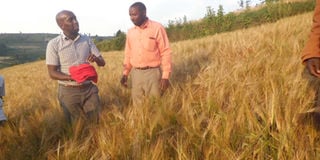Barley farming improves Chele’s livelihood

Uganda Breweries Limited (UBL) managing director Alvin Mbugua (L) explains a point to barley farmer Alex Chele. Through a memorandum of understanding, the brewery company buys barley and wheat from farmers. Photo by Lominda Afedraru
What you need to know:
- BIG BOOST. Joas Mulega, a regional agronomist with Uganda Breweries Limited (UBL), says they are helping farmers with extension services. The agronomist says farmers are faced with challenge of pest and insects destroying crops especially cereals.
A drive to Kabortin village in Kween District is smooth, thanks to a well-tarmacked road that connects the district to neighbouring Mbale District.
The smooth ride, however, ends at the trading centre, with a rough road taking us to Alex Chele’s mixed farm of wheat and barley, our destination.
The farm jointly run by Chele and his family hosts thousands of barley and wheat crops at various stages of growth.
At the farm
It is 2pm in the afternoon when a team of managers from Uganda Breweries Limited (UBL) and Seeds of Gold arrive at the farm.
Chele is busy on his farm with family members harvesting wheat and the yield from the onset looks good.
Barley and wheat growing is a lucrative activity in this part of Uganda due to its temperate climate conditions.
Much as the crops are not part of the priority crops listed by the ministry of Agriculture, UBL has stepped in to partner with the farmers providing them with the required seed because the barley produce is one of the products required for brewing Bell Beer.
How he started
Chele aged 42 dropped out from school in Senior Three due to lack of school fees and immediately ventured into farming.
“I started growing maize on small scale from the family land but in 2005 I began growing barley having seen colleagues from the village doing the same and reaping big. I was doing this on two acres of land,” he notes.
Later in 2016 when UBL came on ground to sensitise farmers about the demand for barley produce, Chele decided to invest big time in barley growing. He started by hiring land from fellow village mates and now he owns 20 acres of land.
“In 2016 UBL came looking for village agents in the barley value chain and I was elected as a parish agent in my village. They asked us to open bank accounts where they (UBL) would pay us directly for the service provided and supply of produce. We were tasked to mobilise farmers to grow barley on large scale, harvest and deliver it to Kapchorwa Commercial Farmers Association where we were paid Shs400 per kilogramme. This price has now changed to Shs1,500 per kilogramme,” he says.
Diversified
The beauty of growing barley is that Chele and other farmers are able to obtain seed and agro inputs such as fertiliser at subsidized price. Once the barley is harvested there is readily available market by UBL.
Chele has apportioned 10 acres of his land for growing barley and he practices crop rotation to maintain the soil fertility. After a season, he grows Irish potatoes on the same land. The rest of the land is used for growing maize, wheat, cabbage and rearing animals.
In the past he used to harvest 150 bags of barley grain from the 10 acre land but this year due to heavy rains, he is expecting to harvest about 70 bags.
He usually earns between Shs17m and Shs18m from barley per season although his total income is about Shs30m per season with sale of maize, Irish potatoes, onions and cabbages.
Before venturing into barley farming, Chele was leading a miserable life but since he has invested in it heavily, he has managed to construct a semi-permanent house.
He also acquired more land in Kapchorwa town where he intends to construct a commercial block.
Chele is using the money he earns from selling barley to pay school of his six children. He has also ventured into agro business where he purchases barley and other farm produce from farmers which he is able to sell directly in the open market in Kampala and elsewhere.
He managed to purchase a Fuso lorry which he uses to transport farm produce to available markets.
Challenges
But it is not all rosy. “There is a time we lost a produce worth Shs800,000 due to poor post-harvest practices,” he recalls. He says his major challenge is the pest, disease and strange weeds which occasionally attack his farm.
“The pesticides are too expensive and sometimes they are not genuine,” says Chele. The farmer says it is important to observe the right agronomy practice and this is provided by the agronomist who is hired by UBL to sensitise farmers about the same.
Joas Mulega, a regional agronomist with UBL, said they are helping farmers with extension services. He said farmers are faced with challenge of pest and insects destroying crops especially cereals.
“We teach them with proper agronomic practices such as crop rotation, applying fertiliser and planting improved seeds,” says Mulega.
Joas Mulega the agronomist in charge of farmers growing produce for UBL in eastern Uganda takes Seeds of Gold through the best agronomy practices farmers growing barley must observe and below are the details. He notes that barley is a cereal crop of importance grown mainly for brewing and sometimes as an animal feed supplement.
Sponsored content




